| Srl | Item |
| 1 |
ID:
138805
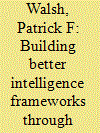

|
|
|
|
|
| Summary/Abstract |
Since 11 September 2001 (9/11), extensive intelligence reform has brought many changes to the “Five Eyes/5 Eyes” intelligence communities. 1 For example, one major theme in the reform agenda has been to “fuse” intelligence more effectively within intelligence agencies and across communities. Questions remain however, as to whether such reform efforts have been effective. Has the rush to fusion resulted in greater effectiveness or additional fragmentation of intelligence?
|
|
|
|
|
|
|
|
|
|
|
|
|
|
|
|
| 2 |
ID:
172082


|
|
|
|
|
| Summary/Abstract |
This article explores common organizational pressure points for ‘Five Eyes’ intelligence communities in their ability to understand, prevent and disrupt potential emerging bio-threats and risks. The acceleration in the development of synthetic biology and biotechnology for legitimate markets (e.g. pharmaceuticals, food production and energy) is moving faster than current intelligence communities’ ability to identify and understand potential bio-threats and risks.
The article surveys several political leadership and intelligence governance challenges responsible for the current sub-optimal development of health security intelligence capabilities and identifies possible policy suggestions to ameliorate challenges.
|
|
|
|
|
|
|
|
|
|
|
|
|
|
|
|
| 3 |
ID:
153075


|
|
|
|
|
| Summary/Abstract |
This article explores whether qualitative research methodologies can help improve strategic analytical processes and products. Currently, in many intelligence agencies, cultural and organizational barriers restrain the development of better strategic intelligence. An emphasis on current intelligence is rewarded over longer-term strategic assessments. However, the demands of an increasingly number of complex emerging threats can only be partially met by current intelligence. Decision-makers also need a revitalized strategic analytical capability to help with policy planning. This article investigates whether further consideration should be given to improving strategic analytical skill sets by a greater adoption of qualitative social research methodologies by the intelligence enterprise.
|
|
|
|
|
|
|
|
|
|
|
|
|
|
|
|
| 4 |
ID:
108739
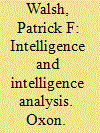

|
|
|
|
|
| Publication |
Oxon, Routledge, 2011.
|
| Description |
xx, 332p.
|
| Contents |
Includes bibliographical references and index.
|
| Standard Number |
9781843927389
|
|
|
|
|
|
|
|
|
|
|
|
Copies: C:1/I:0,R:0,Q:0
Circulation
| Accession# | Call# | Current Location | Status | Policy | Location |
| 056388 | 327.12/WAL 056388 | Main | On Shelf | General | |
|
|
|
|
| 5 |
ID:
153069
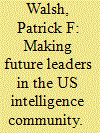

|
|
|
|
|
| Summary/Abstract |
This article explores what factors are important in developing the future leaders of the US intelligence community in the post-9/11 security environment. It surveys traditional leadership theory to assess whether any of its perspectives are applicable to understanding leadership in the intelligence context. It argues, that although some leadership theory may be applicable, the intelligence studies field may be better served by developing its own body of leadership theory. Second, any leadership theory needs to consider together the two synergistic components of intelligence leadership: personal leadership development and the ability to lead organization reform. Furthermore, the role of intelligence governance may be the most critical factor in promoting better leaders of US intelligence agencies and the broader community.
|
|
|
|
|
|
|
|
|
|
|
|
|
|
|
|
| 6 |
ID:
145315


|
|
|
|
|
| Summary/Abstract |
The health and broader biosecurity environment has evolved dramatically since 11 September 2001 (9/11). Less clear is the role intelligence should play in understanding emerging bio-threats. Understanding the role and limitations of intelligence in interpreting a complex set of potential “bio-threats” is essential as advances in synthetic biology and biotechnology grow exponentially. Questions remain, however, as to how well intelligence can function in managing this environment in ways that can reduce both the uncertainty and impact of health/biosecurity related risks and threats for policymakers, first responders, security managers, and public health officers,
|
|
|
|
|
|
|
|
|
|
|
|
|
|
|
|
| 7 |
ID:
143763
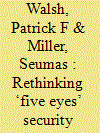

|
|
|
|
|
| Summary/Abstract |
The Edward Snowden leaks challenge policy makers and the public's understanding and perspectives on the role of security intelligence in liberal democratic states. This article explores the challenges confronting security intelligence collection by the ‘Five Eyes’ countries – particularly those most affected by the leaks. We argue that the debate now needs to move beyond simplistic notions of privacy vs. security to a more detailed understanding of the policy and ethical dilemmas confronting policy makers and intelligence agencies. To that end, we provide a schematic framework (methods, context and target) to promote a better understanding of the practical, policy and ethical problems for security intelligence collection emerging post Snowden. The framework is a first step in identifying common principles that could be used develop an ethically informed set of policy guidelines to help decision makers better navigate between citizen's two basic rights: security and privacy.
|
|
|
|
|
|
|
|
|
|
|
|
|
|
|
|
| 8 |
ID:
155220
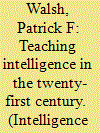

|
|
|
|
|
| Summary/Abstract |
Since 9/11, the ‘Five Eyes’ countries have seen a dramatic rise in intelligence training and education courses across the national security and law enforcement contexts. However, there remains little publicly available empirical evidence to demonstrate specifically where improvements have been made to workplace practices and processes as a result of this investment. This article, argues that the education sector in the intelligence discipline lacks an evaluation research agenda, for validating the workplace effectiveness of training and education programs. Further, a first step in understanding whether curriculum are ‘fit for purpose’ may be articulating some underlying common normative principles for evaluating programs in any intelligence context.
|
|
|
|
|
|
|
|
|
|
|
|
|
|
|
|